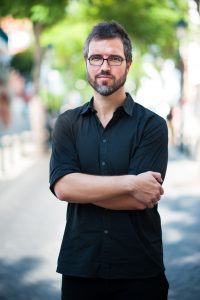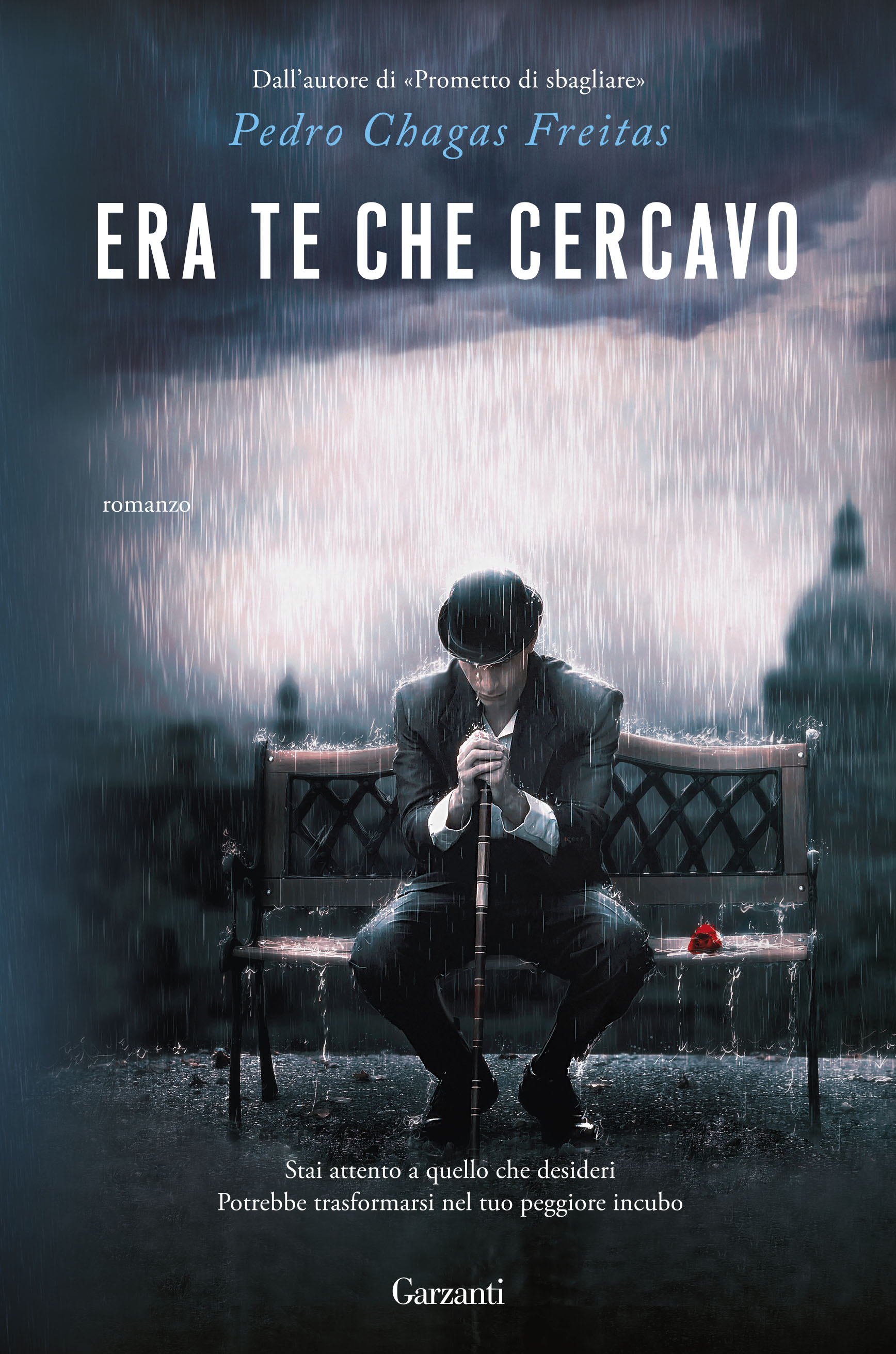La rincorsa dell’amore
(The pursuit of love)
Sito Web: Pedro Chagas Freitas
Facebook: Pedro Chagas Freitas

[one_second](Versione italiana)
La mia penna e il mio sguardo oggi voleranno in Portogallo e faranno visita a un autore che sta conquistando lettori di tutto il mondo, per il suo stile contraddistinto e per il suo modo di guardare le cose belle della vita.
Arrivato in Italia in modo inaspettato, i suoi libri hanno riscosso subito un enorme successo, rendendolo uno degli scrittori più
amati dal nostro pubblico.
Sto parlando ovviamente del grande Pedro Chagas Freitas. Scrittore, giornalista e insegnante di scrittura creatrive portoghese, Pedro scrive romanzi, racconti, cronache e tanti altri testi.
Ma oggi sono qui per parlarvi del suo ultimo libro, pubblicato in Italia con il titolo “Era te che cercavo” (Garzanti Editore). Un viaggio, anziché una storia. Si tratta appunto di un viaggio nella coscienza di ognuno di noi, un viaggio che si compie da soli, ma anche un viaggio che vorremmo condividere con chi ci è accanto. Il protagonista è Carlos, un uomo perso ma anche un uomo ritrovato dall’amore. Ma un amore diverso, un amore che lo ossessiona, un amore che è presenza ma è anche assenza.
Ed è da questa lotta continua che nasceranno i suoi pensieri, pensieri che scorrono sulle pagine e che si leggono come quando si beve un sorso d’acqua. Un viaggio introspettivo, appunto. Nelle memorie, nelle nostalgie, nei desideri di un uomo che vorrebbe l’amore. Ma l’amore non c’è. E forse non c’è mai stato. Carlos si troverà dunque a rincorrere quel fantasma che gli ruota attorno, e ad inseguire quei misteri da cui era sempre fuggito. Suspense, immaginazione, passione, scoperta di noi stessi, sogni.
Sono questi gli ingredienti di questa storia, che è una storia soprattutto nostra. Una storia che viene anche alimentata dallo stile di Pedro, che rende il tutto sempre più magico. “Era te che cercavo” è dunque un inno alla ricerca dell’amore, ma soprattutto al suo potere di essere ovunque.
Lascio ora la parola a Pedro Chagas Freitas, con l’augurio di proseguire in questo meraviglioso percorso.
D: Come nasce l’idea per “Era che cercavo”, che in Italia sta riscuotendo già un grande successo?
R: Il libro è stato scritto dal vivo in luoghi pubblici (librerie, fiere di libri …), in 2012 minuti, in cui il pubblico doveva vedere il processo creativo e lo sviluppo della storia. L’idea è nata grazie alle tante persone che erano lì, e l’ho scritta passo dopo passo. E’ stata un’esperienza unica, e io credo che sia il primo libro che io abbia scritto
completamente in pubblico.
D: Il tuo romanzo è introspettivo, e il tema principale sono i pensieri del protagonista, piuttosto che le sue azioni. È stata una scelta istintiva o razionale?
R: Io credo che in ogni romanzo sia importante equilibrare tensione e psicologia. Avverto sempre che sia questo l’unico modo per scrivere. Non ne ho altri.
D: Nel tuo ultimo libro, l’amore è attesa, ossessione, un fantasma che ruotaattorno al protagonista. Qual è la tua idea di amore?
R: L’amore è tutto. Io non so niente dell’amore, ed è questo il motivo per cui scritto. Sono sempre alla sua ricerca.
D: Il tuo stile è frammentato e così interessante e originale. E’ difficile, durante la stesura, confrontarti con questo stile?
R: Io cerco sempre di avere molti stili. Ogni libro ha bisogno del proprio stile. Ogni libro ha bisogno di trovare il modo migliore per essere scritto: la sua miglior voce. Questo è una delle parti più affascinanti della scrittura.
D: Ci sono delle similitudini o differenze tra te e il protagonista?
R: Ogni personaggio presenta parti di ognuno. Io sono in ogni libro che scrivo. Ogni lettore è in ogni libro che legge. Questa è la magia della lettura. E questa è la magia della scrittura.
D: Nel tuo libro, c’è una parte molto interessante per me: “Come puoi scappare da ciò che non esiste? Io non posso scappare da me stesso”. Secondo te, c’è un modo per cancellare o diminuire un’ossessione che ci perseguita?
R: Noi non possiamo scappare da noi stessi. La scrittura è anche questo: il processo che permette di entrare in contatto con noi stessi. Non c’è via di uscita: tu sei quello che sei ma tu sei anche quello che vuoi essere. Io cerco di essere il miglior uomo che io possa essere. E questo non è un compito facile.
D: Pensi che l’amore arrivi dopo una continua ricerca oppure smettiamo di cercarlo?
R: Non ne ho idea. L’amore è qualcosa che non ha spiegazione, altrimenti non sarebbe amore.
D: Come definiresti il mondo editoriale del Portogallo? È difficile come quello italiano?
R: Interessante: abbiamo molti grandi scrittori. Amo la letteratura portoghese.
D: Cosa vuoi trasmettere alle persone che leggono il tuo libro?
R: Vorrei solo far loro emozionare. Credo che sia l’unico obiettivo nell’arte: l’emozione.
D: Cosa consiglieresti agli autori emergenti che si affacciano per la prima volta al mondo dell’editoria?
R: Leggete, scrivete, confrontatevi. E fatelo sempre più spesso.
D: Per concludere questa intervista, c’è qualcosa che vorresti ai lettori italiani che hanno letto i tuoi meravigliosi libri?
R: Grazie. Dal cuore. Non dimenticatevi di emozionarvi. Sempre. Ogni giorno.
Ringrazio Pedro Chagas Freitas per la sua collaborazione e per il tempo che mi ha donato, augurandogli di continuare a sorprenderci e a sorprendersi.
Recensione, intervista e traduzione a cura di Stefania Meneghella
[/one_second]
[one_second](English version)
Today, my pen and my look are going to fly to Portugal and they’re going to visit a writer who is conquering readers of all the world, for his different style and his wonderful way to see the beautiful thing of the life. Arrived in Italy, his books had an huge success, making him one of the most loved writers of our audience.
I’m talking about the great Pedro Chagas Freitas. Writer, journalist and Portuguese creative writing teacher, Pedro writes novels, stories and other texts. But, today, I’m here to talk you about his last book, published in Italy by the title “Era te che cercavo” (Garzanti Editore). A travel, rather than a story. So, it’s a travel into the consciousness of everybody, a travel that we can make alone, but also a travel that we can make sharing it with our lover. The main character is Carlos, a lost man but also a man who dreams to be saved by love. A different love, a love that obsesses him, a love that is presence and absence.
From this battle, his toughts were born. Thoughts that we can read in those pages in one breath. So, it’s an introspective travel, into memories, into a man who desider the love. But there isn’t the love. So, Carlos is going to run after that ghost who fly around him: the ghost of love. Suspense, immagination, passion, finding of ourself, dreams. Those are the ingredients of this story, that is a story of ours. A story that becomes original also thanks to Pedro’s writing style, that makes everything magical.
“Era te che cercavo” talks about the searching of love, but first of all talks about his power to be everywhere.
Now, I leave the word to Pedro Chagas Freitas, whishing him to continue in this wonderful way.
Q: How the idea for “Era te che cercavo” (a novel that in Italy it’s already a success) was born?
A: The book was written live in public places (libraries, book fairs, …) during 2012 minutes, in which the public could see the creative process and the development of the story. I had ideas from several people – and the I wrote them step by step. It was a unique experience – I believe it is the first book ever written completely in public.
Q: Your novel is introspective, and the focus are the thoughts of the protagonist, rather than his actions. Was it an instinctive choice or a rational idea?
A: I believe that in every novel it is decisive to balance tension and psychology. I always feel that is the only way to write. I have no other.
Q: In your last book, love is waiting, obsession, like a ghost around the main character. What is your idea about love?
A: Love is about everything. I know nothing about love, and that’s why I write it. I’m always searching for it.
Q: Your style is really fragmented and so very interesting and original. Is it difficult, during the writing, compare yourself with this style?
A: I always try to have a lot of styles. Every book needs its own style. Every book is about finding the best way of writing it: the best voice. That’s one of the most fascinating parts of writing.
Q: Are there any similitudes or differences between you and the main character?
A: Every character has parts of everybody. I’m in every book I write. Every reader is in every book he reads. That’s the magic of reading. That’s the magic of writing.
Q: In your book, there is a part very attractive for me: “How to escape from what doesn’t exist? I can’t escape from myself”. For you, is there a way to delete or decrease an obsession that is always with us?
A: We can’t escape ourselves. Writing is also that: the process of getting in touch with ourselves. There is no exit door: you are what you are but you are also what you want to be. I try to be the best human I can be. And it’s not an easy task.
Q: Do you think that love comes after a continuous searching or when we stop to search it?
A: I have no idea. Love is what has no explanation – or it’s not love at all.
Q: How could you define the publishing world in Portugal? Is it difficult as italian publishing?
A: Interesting: we have a lot of great writers. I love the Portuguese literature. What do you want to transmit to people who read your book? I only want them to feel. I believe that’s the only purpose of art: feeling.
Q: What is the suggest that you’d like to give to the emerging writers?
A: Read, write, compare. Do it over and over.
Q: At last, is there something that you want to say to all italian people who read your wonderful books?
A: Thank you. From the heart. Don’t forget to feel. Always. Everyday.
Thank you to Pedro Chagas Freitas for his collaboration and for the time that he gives me, wishing him to continue in this way.
Review,interview and translate made by Stefania Meneghella
[/one_second]

